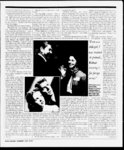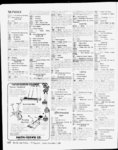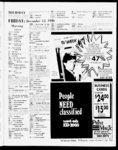| Show ir The Salt Lake Tribune Sunday December B3 7 1986 Ruling Favoring Utes Leaves Duchesne Officials Nervous Continued From H have always considered their reservation lands My view is is that if the enmmuni ties and the governor's office knew what was at stake here they would sav Why are we wasting our money doing this'1 Hu continued litigation and lobbying against the of the old reservation bound aries-said Martin Seneca the He's Washington DC based attorI on agreements made between the s tribe and the "When it's all said and done you won't see any kind of noticeable change on the reservation" said Mr Seneca “And you won t see the Indian tribe do anything it couldn't have " done But Mr Dranev argued the most damage could come in the form of economic development — or lack of it because of the ruling He said if the Indians decide to get involved in planning and zoning decisions in determining what type construction can go in what areas ii already ney There is a misconception that non Indians have that we will go and tax people Hut that won t happen im mediately" said Mr Chapoose who celebrated his birthday on the day the Supreme C'ouit refused to hear the appeal Fart of the s fear is that the I'tes' new authority within the restored boundaries is not completely clear The taxing authority is only broadly described in the test case of I1 S vs Montana The I'tes have always had the authority to levy an oil severance tax on oil wells on trust land land owned outright by the tribe within reservation boundaries Mr Seneca said The court ruling hasn't changed that The state received about $40 million in severance taxes last year and officials say almut half of that came from the Uintah Basin Another question is the $20 to $25 million annual distribution to the slate as its share of federal mineral-leaspayments "Most of that comes from liLM land" said one state official II this is now Indian reservation land docs that mean it is no longer BLM land and who does the federal government pay a portion of the lease payments to?" Besides the severance tax and the state and federal mineral lease royal-tit'from oil and gas production other revenue sources potentially affected by the ruling include a 2 mill tax on oil and gas production anti sales and use taxes Some trilies have claimed the right to impose sales taxi's on the reservation but litigation will probably be necessary to determine the extent of that right — whether it just covers areas the trilie owns outright or areas in which the tribe just exercises jurisdiction but not ownership While tax and mineral lease issues will eventually be settled by litigation depending on what the Indians decide to do with their newly won clout Indians will have no new powers over the white residents in the area said Mr Seneca The ruling allows the Pte tribe1 no criminal jurisdiction over but does allow such authority over tribe members who commit misdemeanors on the additional 9 million acres restored to the reservations The I'tes will have civil jurisdiction within the restored boundaries n could hurt development of the area the resulting economy and relations between the Indians and non Indians in the region affecting their people" Mr Dranev added The Pintail Basin is already suffering from bad economic times with an unemployment rate hovering around 14 percent branse of the oil slump and adversely affecting their "The area has lost 5(H) jobs in re people" Mr Dranev said Then they cent years because of the oil slump" would claim the right to control or said Jerry Conley director of the Pintah Basin Association of Govern prohibit that type of operation " ments The scenario could extend to private property as well Mr Dranev "The counties out here are in a said "What if the trilie decided that a world of hurt" he said "not only be car dealership wasn't dealing fairly cause the economy is bad but also with Indians" The tribe might claim because the loss in federal revenue the right to exercise some kind of sharing funds means a loss of 25 percontrol there cent of the counties' incomes” "So just about anything you could He said tne area has had trouble imagine that a person tries to carry attracting and keeping businesses on in his activities the but it has been brause of the slump tribal government might construe as in the oil industry the most important ingredient to the area's mmo-mnot brause of the Indian jurisdiction question ‘‘If business reacts to this ruling now it will ho nothing more than a response to panic" said Mr Conley "It's too soon to speculate on what will happen " Mr Conley noted it has boon "hard " 'V f'' to sell a house" in the Pintail Basin in recent years Mainly because of the oil slump property values arc way down and ptrplo moving out have taken a loss "I'm sure the jurisdictional issue X- hasn't helped but I don't think that is because of the ultimate impact of the '' ruling which I think is being blown out of proportion “One thing that has hurt has brn the uncertainty about the jurisdiction" Mr Conley said "But now that the ruling is in people will begin asking the tough questions they have been afraid to ask in the past and they will begin getting answers Then we can get back to the business of recovering from the economy” Mr Seneca said certain in the Pintah Basin are causing alarm when tltere is no need for it ‘ ' "Through all of this the Pte tribe has maintained a position of being reasonable and not reacting to the ‘Parade of Horribles' " Mr Seneca ' said referring to scenarios outlined by state and local government offi l intah Basin and on the overall economy of the region he added "Suppose the refinery that operates outside of Roosevelt were to put out smoke or other pollution that they felt was drifting over Fort Duchesne The state has authority to levy a severance tax on the Indian reservation land But Federal law clearly states that in levying the severance tax there must be a direct correlation to services offered Presently Indian leaders contend I'tah government offers almost nothing to the I'tes for the severance tax it takes Mr Dranev said one fear is the rule that tribes have a legal right on reservation land to exercise control over any activity that could affect the health safety or welfare of the Indian people Depending on how that is in terpreted it could have a heavy impact on the lives of the whites in tin1 day-to-da- y - y - 4 v' e U Ute Indian Reservation Ute Indian Reservation poor to Supreme Court Ruling j - fcirl after Supreme Court Ruling t s : ’ '4T 'X ' pr 1 " sw V1 rials r M k - X" ft a X t r ' fie second Pte attorney Denver-baseDan Israel said have been unwilling to settle differences with the Utes outside the courts "The tribe has wanted to sit down with these folks and they (non Indians have always wanted to go to A non-India- court" The recent Supreme Court decision not to review the case lias pul non Indians in a new position Mr Israel son said "They will sit down with us now because they don't have a choice " Mr Seneca said be believes acres added to Indian lands includes the scenic Strawberry River as it cuts through the area’s rug- The three million ged red sandstone cliffs The area is also prized for its oil and gas deposits and generates $40 million yearly in taxes slate and local government authorities will now go to Congress to reduce the res ervation Officials Say Utes Plan No Changes in Hunting Fishing Rules Ry Tom Wharton Tribune Outdoor fc'dit or Recent court rulings returning control of some 3 million acres ot Pintah Basin lands to the Pte Indian tribe will likely have little effect on hunting and fishing regulations in those areas At least that's tb' opinion of the PS Forest Service a lawyer representing the Pte Indian tribe and an assistant Ptah attorney general This means that sportsmen will still be aide to hunt and fish on federal slate and private lands as they have in the post without needing to purchase an additional permit Irom the Pie Indian trilie on the newly expanded reservation lands Nothing will change on the Indian trust lands where musi still purchase permits to hunt and fish from the Pte tribe as has been the case in the past "We haven't formally taken a stand non-India- issue" said Cindy C'hojnacky a PS Finest Service public information officei based in Ogden 'We have talked with Ashley National Forest officials who have ben mostly mi on the within the reservation the same fxicted They said they will continue to manage the forest as they have in the past unless the Indians want to pursue other options "We ll have to respond on an isue-hissue basis It doesn't look like there will be a lot of impact especially on hunting fishing and recreation" she concluded He said Indians would still need to get permission from private land owners to hunt or fish on their prop erty and that state regulations would still be in effect on stale lands The only question left to be settled was Indian rights on federal lands v Bill Geer the director of the Divi sion of Wildlife Resources said the key question is whether the Indians will regulate themselves with regard to hunting and fishing regulations and seasons in the new boundaries attorDan Israel a Denver-baseney for the Pte Indian Trim1 seemed to agree with that assessment "The tribe will tie ahle to regulate its own members on all matters in the new lands including hunting and fishing" said Mr Israel "But can't see the cireumstanct's where the tribe would have any impact on non Indians The trib will end up regulating its memb'rs in cooperation with the s state and the state will regulate That's my hope and I'm reasonably confident that people want to work out these problems and others" 1 DWR officials are concerned about Indians setting early or no deer or elk seasons on public land thus impacting big game hunting during the regu lar season "It may take a long lime to answer all of these questions" said Mr Quea-l"We have more questions than an swers right now " Mike tjuealy an assistant Ptah attorney general who specializes in natural resources issues said the hunting and fishing issue has been well defined by the courts and that non Indian hunting on land Hunting and fishing regulations are pected to change little after the US ex- Su- - preme Court's expansion of Indian lands Additional permit rules are not expected Early Indians Lose Even If They Win Ilislory Shows History has shown that even when the Indians win they risk losing more In the Ihth century when the Indians won a battle they had to flee befoie reinforcements arrived In the 20th century when Indi ails win a court battle they face the possibility of losing the war to Congress plenary power A tilth Circuit Court ol Appeals decision to restore Pte reservation boundaries around 3 million acres max st ill be overturned because ot mo-Ia lon:i high court ruling in Hit hcock which gie (i Ii r Congress authority to negate and adjust anv Indian treaties ir anv wav Marlin Seneca the Pie Tribes attorney in Washington said last eek s ruling will proba hi y to prompt state and local officials tiv to get Congress to take away the Pies restored jurisdiction It wouldn I he the first time the Pte Indians faced the possibility of losing laud locongressional action UOr President Theodore n Roosevelt seized about 2 million Irom the Pintah ( hiray n s A i ervation Part of that land became the town of Roosevelt Some historians have said the acquisition gave an ironic twist to tb phrase applied to Indian reservations lands held in federal trust " In 1IJ82 the Ptes raised a cry of concern over a private letter from Ptah Rep Jim Hansen to then Secretary of Interior James Watt about proposed federal legislation terminating all federal supervision of Indians and tribes Rep Hansen said after further research he did not support the bill and that disclosure of the letter was simply an attempt to discredit him in an election year However the possibility of government land grabbing is only too real to American Indians The I one Wolf vs Hitchcock decision was spawned from such action In 1887 Congress passed the Dawes Act which cant'd for reservations to be be divided up among Indians with the surplus land to be offered to settlers mostly whites The idea behind the Dawes Act was to help Indians learn the con eept of I private properly instead ol will remain communal property Christian reformers saw the action as a step forward in destroying Indian culture and assimilating Indians into "civilized" society The Ptes had rounded up from their lands in Ptah County and elsew here in the 1860s as Mormon settlements pushed south from Great Salt Lake City The Indians were removed to the reservation in the Pintah Valley Reservation Ten years after the Dawes Act Congress parsed legislation calling for the Pte reservation to be divided up among the Indians and the rest opened to settlers The settlers flooded into the Pin-taBasin before the government had surveyed the lands for allotment despite the Indians still hold ing title to the land although the government avoided violence by issuing some other lands to the I 'tes stated Floyd O'Neil from the the 1C of P s American West Cen- ter In Oklahoma during the same period the Dawes Act was work ing too slowlv so in 1882 govern 1 ment officials went to the Kiowa Comanche Apache Flams iKCA) reservation to get the Indians to agree to open up their reservation The KCA Indians claimed their consent was obtained deceitfully but the petition protest was held in a government agent's file for eight years Finally Kiowa leader Lone Wolf filed suit against Interior See ret ary Kthan Allen Hitchcock and in 1803 the Supreme Court ruled "The power exists to abrogate the of an Indian treaty provisions " which rendered the Indians powerless to stop Congressional land grabs The ruling went so far as to declare that Indians could not get the courts to review Congressional decisions in which the plenary tower was used "Flenary authority over the tribal relations of the Indians has IxH'n exervist'd by Congress from the beginning and the poer has always been deemed a political on not subject to be controlled by the judicial department of the ( iov ern ment' the court ruled Laxvw I’mtni I lahX The bottom line though is that there apeurs to be no significant changes for sportsmen in the newly acquired Indian lands Intrrot Land Ruling Doesn’t Involve CUP The recent decision four million acres in eastern Ptah as Pte Indian reservation land will have no impact on the Central Ptah Pro-jtt a water law expert says Laws ('stablished near the turn of the century protect Ptah's interest in the water being captured by CPF projects in eastern Ptah said W Clyde the most notable water lawyer in I 'tah If it the water rights is litigated the law is fairly well jelled It's Itecn m place since 19n8" said Mr Clyde diverted by the Indians But the about 270(1 small Pte population probably couldn't use 2 percent of the already allot ted share of divertable water from the project be1 "In mv mind the amount to be used is the amount susceptible to irrigation when tfie reservation was created The measure was the needs of the irrigable lands" he said That was in the mid 19th century he said so the defined water allotment would not make a dent in the 3 of water that will million acre-fee- l flow to the Wasatch Front The (juestion arose when the l’S Supreme Court last wavk refused to consider an appeal of a federal court decision re establishing old boundaries of the Pncompahgre and reservations which encompass most of Duchesne County and much of Pintah County The lands also encompass much ot the area where the two billion dollar CPF is being developed to capture Colorado River water for use along the Wasatch Front Mr Clyde said that even if the Indi ans make an issue of the water rights "there is no question that Congress has the power over the Indians to do whatever it wants " said the rule is that water susceptible to irrigation may quered" He was speaking of what is called Congressional plenary powers — or absolute powers - that allow Congress to reduce Indian reservation land (the Indians) were con Mr Clyde said "They were then given certain sovereign rights They Mr Clyde i |

































































































































































































































